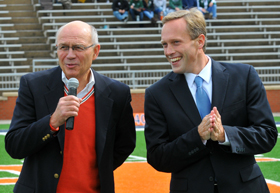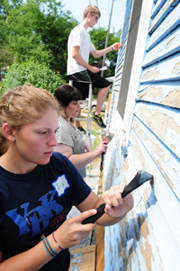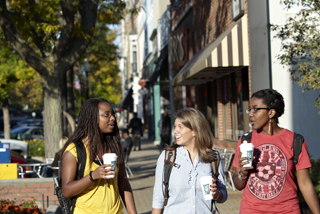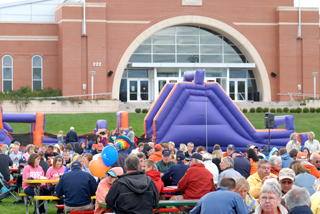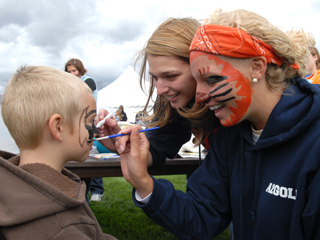The key to understanding the relationship is in the college’s very name. As the young town began to grow from the woodlands of West Michigan, founder Albertus C. Van Raalte knew that education would be crucial in assuring a bright future for the community and its people. Accordingly, he set aside land at Holland’s heart, making Hope College a central part of the city.
Even as both have grown, the dynamic has remained, with Hope and Holland shaping and strengthening one another in ways innumerable as they have traveled together for nearly 150 years.
“Having Hope not just physically in the center of the city but metaphysically in many ways at the center of the city helps create the unique community that we have,” said Kurt Dykstra, mayor of Holland. “There might be other communities that have as good a relationship as Hope and Holland, but I can’t imagine that there are any places where the relationship is stronger.”
The positive relationship is fostered by the 6,000 Holland-area residents who are alumni, but it goes deeper than that. Faculty, staff and students are active volunteers, committed to serving their community in many ways. Area residents frequent arts events, scholarly presentations and the college’s athletic contests, many of them offered free of charge. The college provides a range of community programs like CASA (Children’s After School Achievement) and TRIO Upward Bound for area students, and the Hope Academy of Senior Professionals (HASP) for retirees. Student-athletes are involved with Special Olympics programs and the entire student body has raised over $1.1 million for the Children’s Miracle Network.Hope and the city have worked amicably together in addressing long-term property development that benefits all parties. The college’s campus acreage has increased three-fold in the last decade.
“This could not have happened without cooperative city officials,” said Hope College President Dr. James E. Bultman.
The college recently purchased from the city the municipal football stadium, upgraded it considerably and is allowing local public schools and the city to use it rent-free. The college has a significant presence in the nearby central business district.
“Not infrequently, other colleges and communities ask Hope and Holland how to develop this positive town-gown relationship,” said President Bultman.“One of the first things that I say is that this didn’t happen overnight,” he said. “It’s gone on for years, decades, with the involvement of many people in both the community and the college that worked hard to establish such a strong relationship.
While Hope frequently earns national attention for the quality of its academic programs, Holland, too, has been recognized multiple times through the years. Accolades in the past decade alone have included recognition as a one of the country’s “happiest” and “tidiest” communities, one of the country’s job-growth and manufacturing leaders, as well as inclusion among the “smartest” cities based on education and acclaim as a “distinctive destination.”
These recognitions have benefited the college as it recruits students from around the country and internationally.
“A significant selling-point to prospective students and their families is the quality of life evident throughout the Holland community,” said President Bultman.The first days of every school year are intentionally focused on the town-gown relationship. Since the mid-1960s the college and city have co-sponsored a Community Day picnic that draws thousands.
The second weekend of the school year is declared Time to Serve with hundreds of students, many of them new to the college and community, undertaking community service projects.
The award-winning Holland downtown, with its mix of student-friendly stores, coffee shops and restaurants and located a block from Hope’s campus, is a popular destination for Hope’s undergraduates, their families and other visitors to campus, as are the Lake Michigan beaches just a few miles to the west.
Even as Hope students benefit from the outstanding Holland community, the college and Hope people contribute significantly.
A recent study estimated the overall economic impact of Hope on the Holland region to be $213 million annually. The college is a significant economic engine, with 80.5 percent of its revenue coming from outside the area.The study estimated that $1 in every $40 spent in the region is spent because of Hope, and that one out of every 40 people is in the region because of Hope, which creates 1,000 jobs in the area.
“We have a deep commitment to and understanding that Holland is a better place because Hope is here – and we also think that Hope is a better place because it is located in the heart of Holland, Michigan,” Dykstra stated. “I really cannot imagine what Holland would be like without a strong Hope College… and, working together, I am confident that we will never have to find out.”


